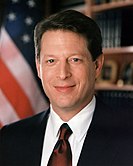United States presidential election in Michigan, 2000
|
|
||||||||||||||||||||||||||
|---|---|---|---|---|---|---|---|---|---|---|---|---|---|---|---|---|---|---|---|---|---|---|---|---|---|---|
|
||||||||||||||||||||||||||
|
||||||||||||||||||||||||||

County Results
Gore—60-70%
Gore—50-60%
Gore—<50%
Bush—<50%
Bush—50-60%
Bush—60-70%
Bush—70-80%
|
||||||||||||||||||||||||||
|
||||||||||||||||||||||||||
The 2000 United States presidential election in Michigan took place on November 7, 2000 throughout all 50 states and D.C., which was part of the 2000 United States presidential election. Voters chose 18 representatives, or electors to the Electoral College, who voted for President and Vice President.
Michigan was won by Vice President Al Gore by a small margin of 5.2%. The western part of the state, which is more rural, was overwhelmingly Republican and Bush won most of the congressional districts and counties in that region of the state. His best performance was in Ottawa County, where he won with over 70%. Gore did fairly well in the eastern region of the state. His best performance was in Wayne County, the highest populated county in the state and home of the city of Detroit. He won the county with 69%, with his second best performance in Genesee County, where he got over 62% of the vote.
This election marked the first time since 1976 in which Michigan's electoral votes did not go to the overall winner of the general election, although the state was carried by the candidate who ultimately lead in the popular vote.
Technically the voters of Michigan cast their ballots for electors: representatives to the Electoral College. Michigan is allocated 18 electors because it has 18 congressional districts and 2 senators. All candidates who appear on the ballot or qualify to receive write-in votes must submit a list of 18 electors, who pledge to vote for their candidate and his or her running mate. Whoever wins the majority of votes in the state is awarded all 18 electoral votes. Their chosen electors then vote for President and Vice President. Although electors are pledged to their candidate and running mate, they are not obligated to vote for them. An elector who votes for someone other than his or her candidate is known as a faithless elector.
...
Wikipedia


